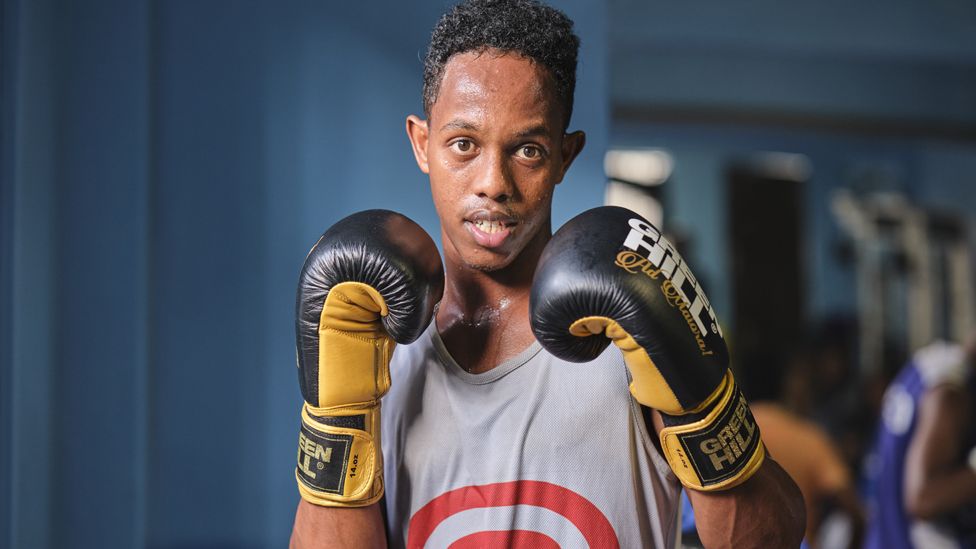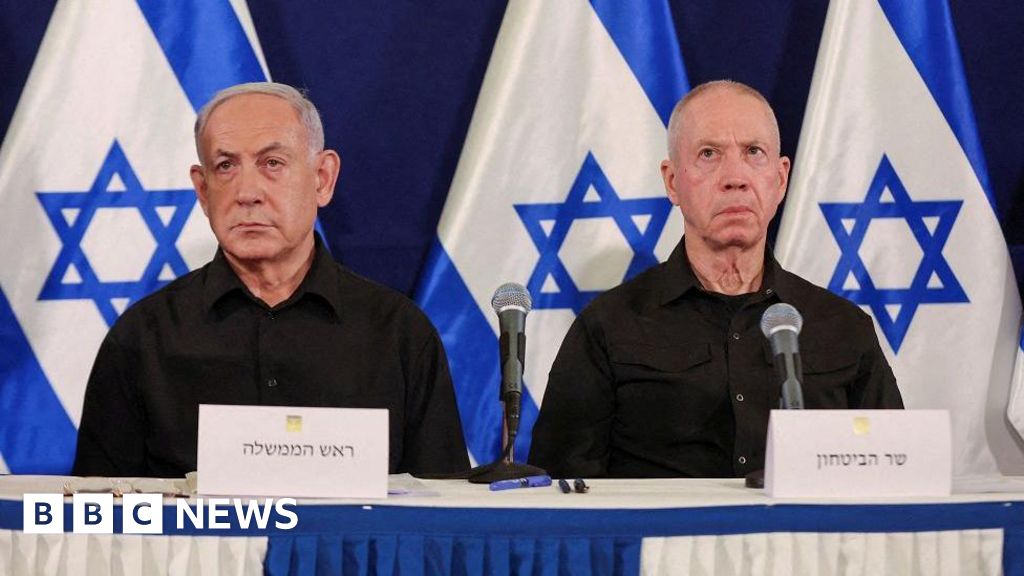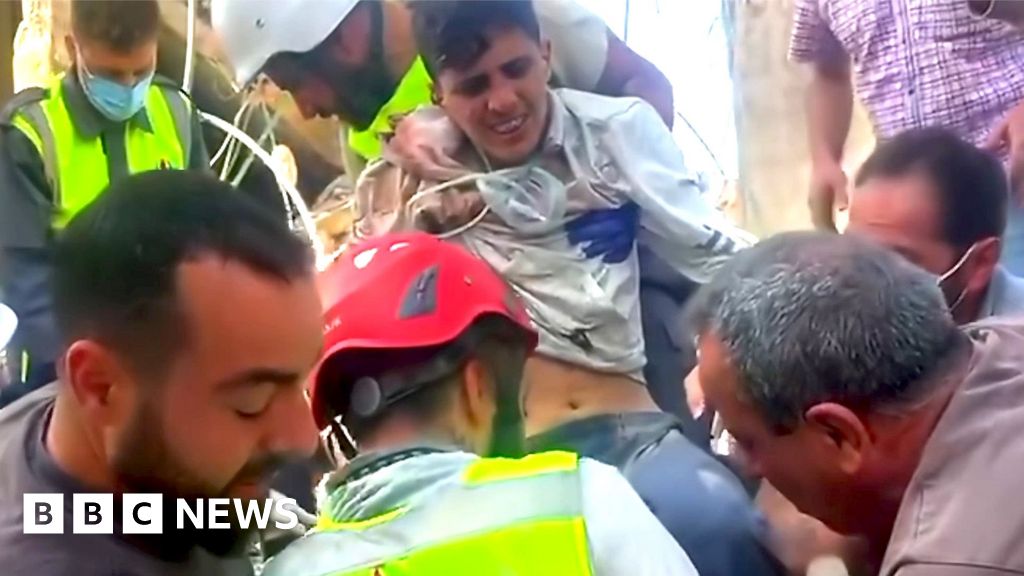ARTICLE AD BOX
 Image source, Abdishukri Haybe
Image source, Abdishukri Haybe
By Mohamed Gabobe
Mogadishu
Boxing was once banned in Somalia, but the sport is being revived in the country still wracked by violence after years of civil war. The only official boxing club is proving a haven for some in the capital, Mogadishu.
"I grew up wanting to learn how to fight, so I could protect my family. This is what later drew me closer to the sport," Najib Mohamed tells the BBC in between punches.
Slimly built, with his hair spraying sweat every time he throws a punch, the 20-year-old is sparring in the ring in the centre of the gym.
Nearby, dust fills the air as another young boxer strikes a battered punchbag. A thump is followed by the rattle of the punchbag's chain like someone shaking a set of keys.
The doors stay latched open on to the street in this old part of Mogadishu, which provides a slight breeze amid the scorching heat. Flickering lights help illuminate murals of boxers painted across the scarred walls.
Mohamed was brought up during violent and chaotic times in Mogadishu, which gave rise to his interest in boxing. Times are still hard.
"In this city, negative temptations and uncertainty are a part of everyday life. When I jump in the ring, it numbs the pain and takes me away from the troubles around me."
Mohamed was just four when his father and grandfather were killed in 2007. They were shot during a violent siege of the capital when troops from neighbouring Ethiopia were trying to unseat the Islamic Courts Union, which then controlled the city.
Just one traumatic story among the many carried by this fledgling group of boxers.
Image source, Abdishukri Haybe
Image caption,Mohamed Amin has written a tribute to his mother on his gloves
The Somali Boxing Federation (SBF) dates from 1935 but the sport was banned in 1978 by the military government of the time after someone died while taking part in a bout. It was only 40 years later - in 2018 - that boxing made a comeback and the club was reopened.
Now its young members dream of international success.
A group of them sit on a rickety bench cradling their gloves watching the training session.
Abdirahman Mire, the boxing federation's secretary general, also looks on.
"Many young people in this country have a passion for boxing but lack the support. It's only right that I play my part," he says.
Image source, Abdishukri Haybe
Image caption,Mohamed Amin hopes to make it to the Olympics one day
Mire was responsible for the resurrection of the boxing club when he returned to Somalia from Finland, where he had been living since fleeing the civil war in the early 1990s.
"I was a young athlete like them at one point in my life. It wasn't easy leaving Finland but it was worth it, despite the difficult circumstances at hand.
"With this generation, by the time you become an adolescent, you've seen it all. The effects of the violence are all around you and these youth utilise their time in the ring to escape the madness around them and focus on becoming better boxers."
Mohamed has certainly progressed since joining the boxing club in Mogadishu, where he was able to train and learn the sport that he loved first hand. He has now won gold in the lightweight division at a local boxing tournament.
"I see myself going beyond this small boxing gym in the old city quarters to make it out of Somalia, not only to reach my goals professionally but also set an example for future generations of fighters."
He hopes to provide a better life for his family in Somalia.
This message resonates with fellow young boxer Mohamed Amin.
The 21-year-old middle-weight hails from a similar background and says the boxing club has had a positive impact on his life, despite growing up in a bleak environment.
"From an early age, I was mesmerised by boxing and it kept me glued to the TV," he says.
"During my upbringing there was nowhere to play sports, let alone box because of the war but my mother would always support me in my ambitions.
"It's the reason I have her name written on my gloves and is a reminder of who I fight for, every time I get in the ring," he tells the BBC as he clutches his gloves together.
Amin's hard work and dedication to boxing began to bear fruit in the years that followed and ultimately opened new doors.
"I had the opportunity to represent Somalia on the world stage by landing a spot at the African Amateur Boxing Championships in Maputo, Mozambique last year."
He now hopes to represent Somalia at the next Olympics in Paris.
Image source, Abdishukri Haybe
Image caption,Amin (L) and Mohamed (R) are committed to raising the profile of the sport in Somalia
Somali boxing made a breakthrough at the last Olympic Games in Tokyo when London-based Ramla Ali boxed for Somalia.
"She showed dedication to the sport and her success inside the ring is motivation for many of the young people at the Mogadishu boxing club today who yearn to become world-renowned boxers," SBF head Mire tells the BBC while flipping through a collage of Ali's fights.
Many young Somalis, boxers or otherwise, would like to live, like Ali, in the diaspora.
The poverty and seemingly random violence outside the relative calm of the boxing club is motivation enough, but whether leaving is realistic the young boxers continue to find solace in the sport.
"We fight for the chance at a new life, both inside and outside the ring," Amin says.
"These gloves we wear aren't for show but a means for a better life. We might not have enough resources in this country but that doesn't deter us. We've been through far worse and will continue on fighting."

 1 year ago
25
1 year ago
25








 English (US)
English (US)